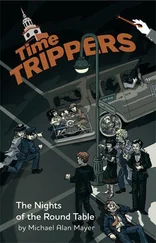“The main thing is: don’t mention my name if there’s any way of avoiding it. As soon as he hears it he’ll know what’s going on. I promise you I’ll tell him in due course, but if he found out prematurely it could be dangerous. For whom? I don’t want to worry you unnecessarily.”
Early the following morning a young man appeared at the Hotel am Kurfürstendamm. He wore a tight-fitting grey worsted suit and was carrying two capacious, almost new briefcases, one in either hand..
When the page-boy on duty tried to take one of the briefcases the young man gave him a curt “No thank you” and marched up to the reception desk.
The chief receptionist studied the approaching figure attentively. He found himself unable to classify it with his accustomed precision, which stimulated his curiosity. Perhaps the young man had wandered into the hotel by mistake, but judging by his air of solid self-assurance this seemed unlikely.
“General von Seydlitz-Gabler,” said the young man.
The chief receptionist pretended not to know what was expected of him. “I beg your pardon?”
The young man looked as though he were incapable of being disconcerted or over-awed. His eyes, which had an appraising glint, were slightly narrowed like those of a man squinting along the sights of a rifle. He continued to grasp the briefcases firmly in both hands.
“I’d like to speak to General von Seydlitz-Gabler.”
“In what connection?”
“That’s none of your business,” said the young man with compelling simplicity.
The chief receptionist bridled almost imperceptibly. The youth was right. It wasn’t any of his business, but there was no need to be grossly offensive about it. People just didn’t talk to chief receptionists like that—thought the chief receptionist. The young man evidently had no such inhibitions.
“I can’t stand around here all day.”
“What name shall I give?” The chief receptionist was breathing heavily now, like someone who was being forced to run up a mountainside at pistol-point. With barely concealed animosity, he added: “Your name, please.”
“My name is unimportant.”
“Really, sir!” expostulated the chief receptionist, on the verge of losing his self-control. “What do you mean? I can’t just tell General von Seydlitz-Gabler…”
“Yes, you can,” said the young man with undiminished composure. “All you need say is that I’m here on the orders of General Tanz.”
The chief receptionist picked up the ’phone and asked to be put through to General von Seydlitz-Gabler’s suite, eyeing the young man with mounting repugnance as he did so.
The object of his resentment stood there surveying his surroundings like a yokel on a village green. The luxuriously appointed foyer appeared to leave him completely unmoved. On the contrary, the chief receptionist thought he detected a look of unalloyed disdain in his eyes. He was tempted to wag his head reprovingly, but his telephone conversation temporarily precluded any such display of emotion.
“The General is expecting you,” he said reluctantly. “I’ll have you taken up to his suite.” He snapped his fingers for a page-boy.
The young man followed the boy to the lift, still carrying his two briefcases and striding across the Persian carpets as if they were a stretch of asphalt.
Upstairs, von Seydlitz-Gabler was already awaiting his visitor. He stood in the centre of the sitting-room of his suite clad in a blue silk dressing-gown, a grey silk scarf at his throat and his feet thrust into a pair of stylish travelling-slippers. He looked benevolently paternal.
“Well, my boy,” he inquired sonorously, “what have you got for me?”
“A letter from General Tanz, sir.” The young man put down one of his briefcases, felt in his pocket and produced an envelope.
Von Seydlitz-Gabler’s practised eye immediately spotted what the chief receptionist had failed to comprehend. The young man confronting him was a soldier in civilian clothes. From his manner he could only have one function-that of personal orderly.
“Name?” von Seydlitz-Gabler asked benignly.
“Wyzolla, Alfred, sir,” came the prompt reply.
“Rank?”
“Sergeant, sir.”
“Which arm?”
“Infantry, sir.”
“Excellent,” declared von Seydlitz-Gabler in tones of approval, and devoted himself to the contents of the letter which he had been handed. It was written on unheaded paper in a large, imposing hand, and ran as follows:
My dear General,
Many thanks for your extremely cordial letter. I have never forgotten the momentous hours which I was privileged to spend in your company. I gratefully accept your kind invitation and look forward to seeing you again. Please convey my warmest regards to your lady wife.
Yours very sincerely, Wilhelm Tanz
Von Seydlitz-Gabler scanned the strong, angular characters intently for a moment. They marched across the paper like columns of well-disciplined soldiers, visible testimony of General Tanz’s fighting spirit. Then he went into the bedroom next door.
Frau Wilhelmine was just putting the finishing touches to her toilette. Seeing her husband’s reflection, agreeably reduced in size, in the mirror before her, she turned to him with an indulgent smile. Von Seydlitz-Gabler held out the letter.
“He’s coming,” he announced with scarcely suppressed triumph. “You see—a few lines from me did the trick, even after all this time.” He bent forward confidentially. “Do you know, it’s suddenly like old times again—I can feel it. Tanz has sent an orderly along in advance, just as he always did. A fine youngster—first-rate material. It’s deplorable to think of a lad like that serving under the Communists!”
Frau Wilhelmine steered her husband back to the point with her usual objectivity. “You ought to invite General Tanz to lunch.”
“An excellent idea.”
“Especially as Ulrike will be eating with us. I call that a fortunate coincidence. We must make the most of it.”
Von Seydlitz-Gabler nodded and returned to the sitting-room, where he found Wyzolla, Alfred, standing exactly where he had left him. The boy was evidently waiting for instructions, directions or orders, and von Seydlitz-Gabler was only too happy to supply them.
“Right!” he exclaimed with youthful zest. “What’s the form?”
The position, as summed up by Wyzolla, was as follows: Tanz had sent him on ahead with instructions to hand over the letter and then make sure that suitable accommodation, i. e., a hotel room, was available. If so, he was to make immediate preparations for the General’s arrival; if not, he was to inform the General without delay. The General had travelled up to East Berlin for a conference. Unless otherwise notified, he would automatically arrive at the Hotel am Kurfürstendamm in three hours’ time, at l p. m.
“First-class organization,” von Seydlitz-Gabler commented admiringly, “but only what I should have expected. We’ve made some arrangements too.”
They had—on Kahlenberge’s advice. A suite had already been reserved for Tanz, and it proved easy enough to obtain a comparatively modest single room for Wyzolla.
Wyzolla picked up his briefcases, froze smartly to attention in a way that gladdened von Seydlitz-Gabler’s heart, and betook himself to the suite which had been earmarked for General Tanz.
Once there, Wyzolla alerted chamber-maids, floor waiters and valets and issued them with precise instructions on how to cater for General Tanz’s needs. He then instituted and supervised the spring-cleaning of the entire suite. When this had been carried out to his satisfaction—not that he voiced it—he dismissed the staff and carefully unpacked the contents of his briefcases.
Читать дальше












